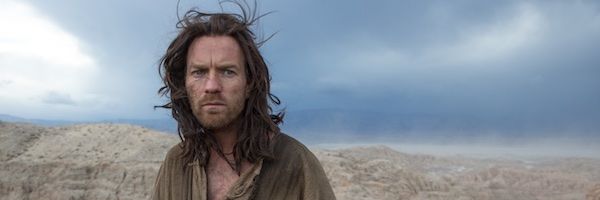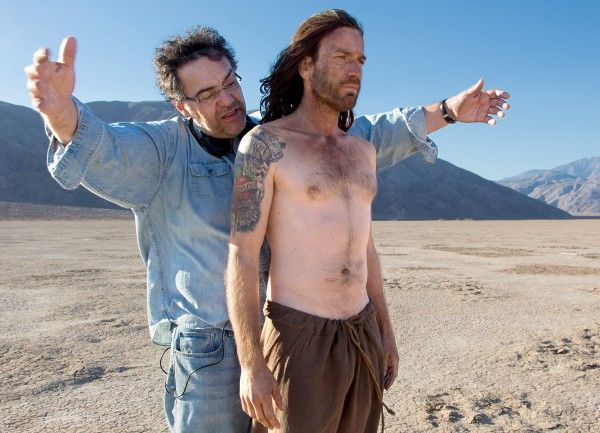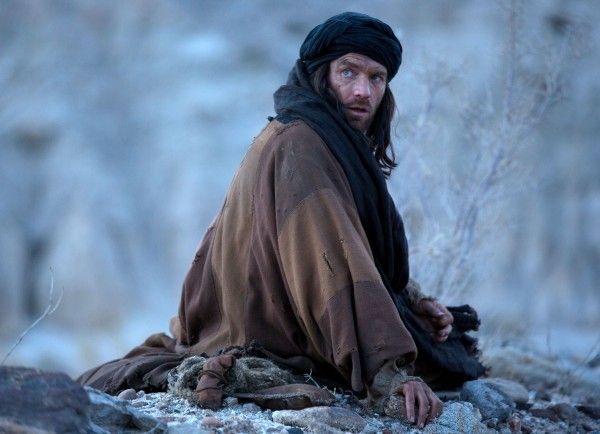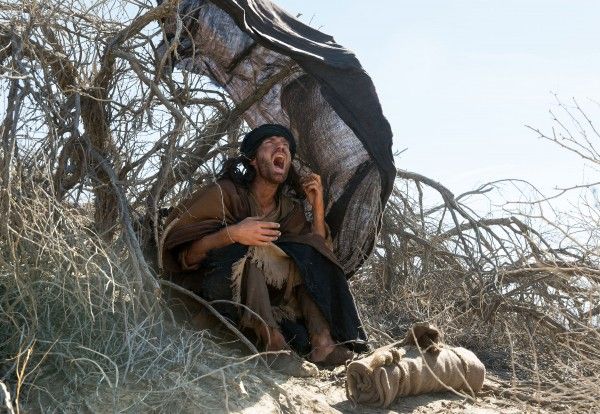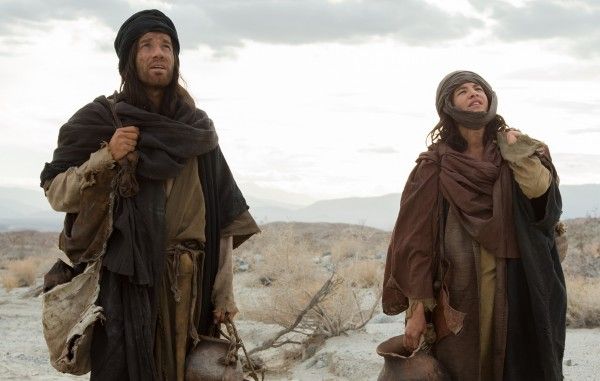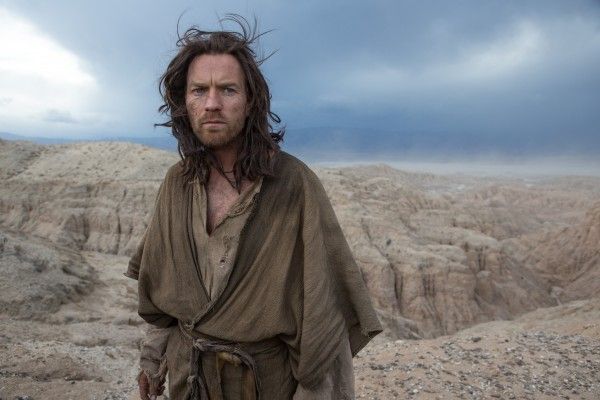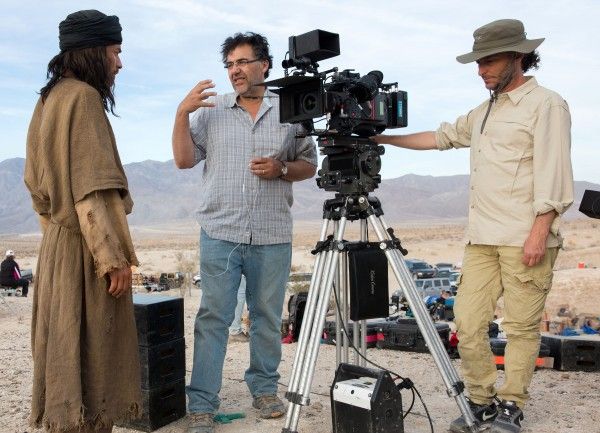From writer/director Rodrigo García, Last Days in the Desert follows a holy man known as Yeshua (Ewan McGregor), who has spent weeks subsisting on only water and prayer. On his way out of the wilderness, he comes across an ordinary family in crisis and struggles with the Devil (also played by McGregor) over their fate.
At the press day for this film, which is an imagined chapter from Jesus’ 40 days of fasting and praying in the desert, actor Ewan McGregor spoke to Collider for this exclusive interview about how Last Days in the Desert came his way, why the project appealed to him, how he enjoyed being a part of such a small production, and being his own co-star. He also talked about the fact that no one has actually approached him about doing solo Obi Wan films, what he enjoyed about directing American Pastoral, how the Trainspotting sequel is going, and what a great time he had making Beauty and the Beast with director Bill Condon.
Collider: When you received this script and it was only about 60 pages, were you extra curious about what this film was?
EWAN McGREGOR: I loved it. I had met Rodrigo [García] when I was on holiday with him. I was on Christmas vacation and we’ve got mutual friends, so we went away together to Mexico and I really liked him. I had never met him before, but I liked him. And he was there with his old mates that he grew up with, so I got to see a great side of him, I suppose. Afterwards, his producer set me the script. He didn’t because he was too embarrassed, having met me socially, to suddenly force a script on me. I didn’t know what it was, so when it came, I was slightly surprised that it was 60 pages. It was really short.
Also, nobody told me what it was about or who it was about, so I started reading the script and it just described a man walking in the desert, a man sleeping under a tree, and a man drinking water. It was page after page of description with no dialogue and no mention of who he was, where he was or when he was. So, when he finally does meet another character, he’s meeting himself and I was thinking, “Okay, maybe it’s a fantasy movie.” I didn’t know what it was. And then, I turned the page and the first line of dialogue was this other character and it said, “Lucifer,” and I went, “Oh, right, now I know who we’re talking about.” Already, I was in. I could have stopped right then and said, “I’ll do it.” It had a beautiful pace and a unique quality to it, and even though there was very little dialogue, the descriptions were so beautifully written and evocative and I could feel why they were there. It was great.
Did you enjoy getting to be a part of something so atypical, with the short script, small cast and many scenes opposite yourself?
McGREGOR: Yes. It was small, and it’s so lovely to make films like that. One of the difficult things about making films is the scale of them and the number of people, and trying to do something intimate and real when there are fucking 500 people standing around. It’s difficult. But when you’re in the middle of the desert with 15 or 20 people in the crew and four actors, and you’re in the real surroundings with the real temperature and everything is right, it’s easy.
How did you find yourself as your own co-star?
McGREGOR: It was easy because I worked with a guy I know very well, Nash Edgerton. He’s doubled me, as a stunt double, since 1999, not every time, but a lot of the time. He’s a filmmaker, a stunt coordinator and an actor. I’ve known Nash for years, and I really get on very well with him. We asked him to do the cliff drop and sequence in the movie. I suggested him to Rodrigo, and Rodrigo asked him to be in charge of our safety. And because he was there, I suddenly thought, maybe he could play opposite me. But, it’s a tall order because it’s a lot of dialogue to learn. Really, probably the most dialogue in the film is between the devil and Yeshua. So, he was learning all of this dialogue, and we worked on it every night, two or three hours a night, just on the lines. And then, we’d swap and do the other side. It was a lot of work to not be in the movie, at all. One day, I had this realization about it and I said, “I feel really guilty that I’m making you do all this work and no one is going to know.” And he said, “No, it’s perfect for me. I want to act to make me a better director. This is perfect. I get to experience the acting, and no one is ever going to see it.” So, it worked out to both of our credit, I guess.
You recently spoke to my boss, Steve Weintraub, and he asked you about solo Obi Wan films, and that interview seemed to spread across the internet. Have you gotten any reaction from LucasFilm about that?
McGREGOR: No, I just get asked about it all the time now. People think that I’m campaigning to get a spin-off film, and I could care less. I said I would do it. If they asked me to, I would be happy to. But it looks like I am campaigning for it, just because I get asked about it, all the time. So, I would like it to be known that I don’t bring it up, at these interviews, of my own free will. I only respond to questions I’m asked to. I don’t know anything about it. They’ve never approached me about it.
You directed a movie, American Pastoral, which I hear turned out great. How did the test screenings score? What was that process like?
McGREGOR: We had one test screening in Pasadena, but it was a very bland one, in terms of asking the audience what they thought. I would have preferred to have a bit more feedback from the audience. But I was happy with the film and so were the producers, so nobody cared very much to find out. The most important thing, for me, in that experience, was just to see how it played in the room with 300 people that I didn’t know. Up until that point, only a handful of people had seen it, who I did know. I was getting good feedback from people I respected and liked and admired, but the truer reaction is in a cinema full of people who have got no relationship with me. And it played very well, I think. I’ve almost finished it. I’ve got about three weeks left. I’m about to record the music in London. I’m finishing the color correction, at the moment, and then we do the mix until the middle to end of May, and then, I’m finished. It’s been the most extraordinary experience, and I’ve enjoyed every minute of it. It’s been creatively satisfying, but exhausting, just with the longevity of it. I’m looking at the same images that I imagined last January. It’s a long time. As an actor, I’m used to working in blocks of three or four months, at the most. This is a year and a half.
Is directing something that you’re hoping to do again?
McGREGOR: There are a lot of actors who have made a film. I don’t know. I think I will make another film because I’ve loved it so much and I’m proud of it. But, not straight away. I definitely will wait to find a story that is as important to me as this one, before I do it again. I don’t think you could do it any other way. It’s so costly, in a way, that you have to have to do it, in order to do it. If it was just a job, I think you’d just kill yourself.
How are things going with the Trainspotting sequel? Is that something you ever could have pictured yourself doing, reuniting with everyone again?
McGREGOR: Well, I always thought it could happen. There was a time when I didn’t imagine doing it. There was never a script of it that I read. Nobody ever sent me a script of it. For ten years, the novel has been around, but it’s taken until just last winter that I got the script for this one. I forget exactly when I read it, but it was late last year, at some point. It’s a really strong script, and it’s going to be extraordinary to be back working with Danny Boyle again, who I always adored working with, and the guys – Jonny [Lee Miller], Ewen [Bremner] and Bobby [Carlyle]. It will be quite extraordinary to do a sequel to a story we made twenty years ago.
Does the sequel have a title yet, or is it still untitled?
McGREGOR: It’s sort of being called T2, but I don’t know if that’s what it’s going to end up being called or not. At the moment, everyone is calling it T2.
Could you ever have imagined that you could add playing Lumiere, the Beast’s singing candelabra, in a live-action Beauty and the Beast film? What was that experience like, making that film with Bill Condon?
McGREGOR: It’s no different to anything else. It’s interesting because it’s partly animated, but partly not. Voicing an animation is a process. They partly animated off of what you’ve done, and you partly perform off of what they’ve done. It’s a nice collaboration. I really like working with Bill Condon. He’s a director I’d love to work with again. And there are some great actors in it – Stanley Tucci, Emma Thompson, Sir Ian McKellen. We had a great time together when we were working on set. And then, I’ve enjoyed working with Bill on the post-production side of it, as well. And recording the big “Be Our Guest” song was just fantastically fun, and nothing something I’ve done in quite awhile. I haven’t recorded a song for a movie since Moulin Rouge, so it’s been quite a long time.
Last Days in the Desert opens in theaters on May 13th.

